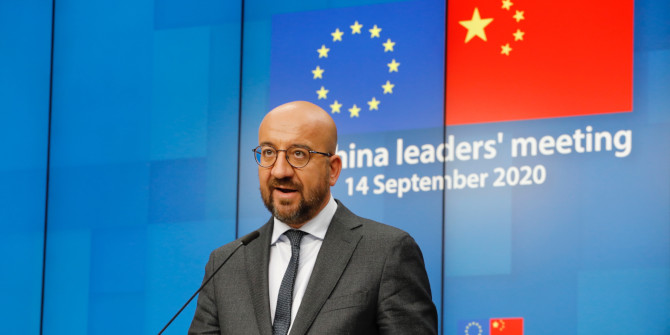At the end of 2020, China and the EU reached agreement on a new investment deal, the Comprehensive Agreement on Investment (CAI). Rémy Davison and Nina Markovic Khaze draw on Australia’s relations with China to identify some key lessons for the EU.
In 2020, as the EU and China finalised their Comprehensive Agreement on Investment (CAI), Australia-China cooperation achieved a quiet milestone of its own. The two countries’ 30-year bilateral Science and Technology collaboration has long been viewed with envy in the West as one of the closest partnerships between a democratic country and an authoritarian regime. Notwithstanding their bilateral free trade agreement, the last twelve months have seen this relationship plummet to its lowest diplomatic point in five decades. But what can Australia’s experience with China tell us about the likely trajectory of relations between the EU and China following the new investment agreement?
Reaping the benefits
With Britain preparing to accede to the European Community (EC) in 1973, Australia was compelled to diversify its exports by turning to Japanese, South Korean and, ultimately, Chinese markets, particularly as the EU’s Common Agricultural Policy closed off most Australian food exports to the EC. From 2000, Australia experienced an extraordinary period of growth and wealth, fuelled by China’s insatiable appetite for black coal and iron ore, and a swathe of investments in Australian residential real estate, commercial property and farming land. Australia’s education sector became its largest services export, with 260,000 Chinese students enrolled in 2019 and comprising around 38 per cent of Australia’s international student market.
In 2018-19, a record number of Chinese tourists visited Australia (1.45 million between 1 July 2018 and 30 June 2019), an increase of approximately 400 per cent from 353,000 in 2008–09. Chinese tourism contributed more than $AUD12.4 billion to the Australian economy in 2019 alone. Numbers remained strong, despite the Chinese Foreign Ministry issuing a warning in April 2018 to Chinese citizens about unspecified security risks in Australia – an ominous sign of a declining relationship.
Covid-19 and Australian diplomacy
The origins of Australia’s trade and diplomatic war with China, as well as its increasingly-diversified trade strategy, are more than a decade in the making. Australia’s newly-elected Labor government in 2007 (under Kevin Rudd) relaxed regulations on foreign ownership of real estate, but reversed these changes with equal rapidity.
In 2012, the Labor government made what proved to be a watershed decision by banning Huawei from building any of the $AUD36 billion high-speed National Broadband Network (NBN), due to concerns surrounding the vulnerability of the network to foreign cyber-attacks. The decision was heavily influenced by revisions to the 60-year-old Australia-New Zealand-US (ANZUS) military alliance, which saw Washington and Canberra insert cyber-security cooperation in their defence partnership.
The ban on Huawei in Australia was supported by the Liberal-National coalition government, which was elected in 2013. Despite Huawei’s protests, the government resuscitated the China-Australia Free Trade Agreement (ChAFTA), which was promulgated in 2015. In the same year, a Beijing-affiliated firm Landbridge was granted a $AUD500 million, 99-year lease over the Port of Darwin, a point of controversy, given the stationing of a US Marine rapid reaction force in Darwin, and an airbase. The 2020 Foreign Relations Act empowers the Federal government to overturn international agreements signed by state governments.

President of the European Council, Charles Michel, speaking during an EU-China leaders’ meeting in September 2020, Credit: European Council
In hindsight, 2015 represented the high water mark in the Canberra-Beijing diplomatic partnership. Relations chilled considerably following the accession of the Liberal Party’s former Communications Minister Malcolm Turnbull (2015–18) to the premiership, during a period that saw Beijing publicly denounce a July 2016 ruling on the South China Sea (SCS) of the Permanent Court of Arbitration (PCA). Immediately afterwards, in a UN General Assembly declaration, Canberra stated that China’s SCS claim had no legal basis and called upon Beijing to respect the PCA ruling.
Canberra went further by rejecting China’s specious legal arguments that had not been tested by the PCA. Subsequently, Australia implemented hedging strategies, including the widening of its free trade agreement negotiations to encompass the EU and the ASEAN-centred Regional Comprehensive Economic Partnership (RCEP). In November 2017, Canberra issued its first foreign policy white paper since 2003, which shifted Australia’s focus from the Asia-Pacific to the ‘Indo-Pacific’. It shared a strikingly similar language to the US National Security Strategy (released a month later), criticising China’s repudiation of the rule of law; and confirming the Washington-Canberra axis’ pivot to the Indo-Pacific.
Investigating Wuhan
In April 2020, Australian Prime Minister Scott Morrison, from the Liberal-National Coalition, followed in Washington’s footsteps by calling for an international investigation into the origins of Covid-19, drawing China’s ire. Minister for Foreign Affairs urged for an investigation outside of the auspices of the World Health Organization (WHO).China’s senior diplomat and Deputy Ambassador in Canberra, Wang Xining, has accused Australia of playing politics, describing the call for an international investigation as unfriendly to China and “shocking”. On 26 September 2020, Morrison reiterated his original call at the 75th United Nations General Assembly.
China’s trade restrictions against Australia
China’s response to Australia’s call for an independent international investigation into the origins of Covid-19 was anything but mild. It initiated what experts have dubbed a trade and diplomatic war against Australia – something China has repeatedly denied. Trade restrictions against Australian exports into China that Beijing progressively enacted were driven in part by China’s own domestic protectionist policy choices, and partly as “payback” for Australian restrictions placed on Chinese foreign investment since 2018, which China claims were worth around $14 billion.
Since March 2020, China has put high tariffs on Australian key domestic export commodities to China, including barley, beef, seafood, wine and beer, with non-tariff barriers applied to timber and coal. This represents a unilateral abrogation of ChAFTA. Modelling predicts a full-blown Australia-China trade war would have a significant impact on Australian GDP and per capital incomes. The only export commodity that remains largely unaffected is iron ore, in part due to Brazil’s difficulties supplying China during a large Covid-19 outbreak of its own, and partly because of China’s high financial stake and investment in iron ore production in Western Australia. Australia took China to the World Trade Organization over barley tariffs in December 2020.
In November 2020, China launched an unprecedented diplomatic attack against the Morrison Government, accusing it of trying to “torpedo” bilateral relations. At the same time, the Chinese embassy in Canberra deliberately leaked a list of ‘14 grievances’ to the two most important broadsheet newspapers in Sydney and Melbourne. Diplomatic tensions escalated when a Chinese foreign ministry official shared on social media a doctored image of an Australian soldier in a compromising position in the context of the Brereton report – which found that some Australian special forces members committed crimes against Afghan civilians, including unlawful killing, deprivation of liberty and torture. Although the Australian Government had issued a formal apology to Afghanistan’s government, Beijing saw the issue as a golden opportunity to launch a tirade against liberal democracy, accusing Australia of human rights “double standards”.
Closing the door to Beijing
Before Covid-19, tensions were intensified following changes in Australia’s domestic policies and legislation which were seen by Beijing as essentially against Chinese business interests in Australia. In addition, during Australia’s 2019 federal elections, there were reports suspected foreign interference by China, which was repeatedly denied by Beijing – building on the national discourse initiated after Professor Clive Hamilton’s controversial book Silent Invasion which accused China of undermining democracy in Australia. In November 2020 a Chinese-Australian from Melbourne became the first person ever to be charged under Australia’s foreign interference laws.
But even prior to the pandemic, investment from China plummeted in 2019, as the Huawei dispute worsened. In 2018, the Federal government introduced the Foreign Influence Transparency Scheme, under which Australian nationals and residents are obliged to register if they either “undertake activities on behalf of a foreign principal” or, “undertake certain ‘registrable activities’”.
In 2019, legislation regulating foreign investment was introduced into Parliament. The Foreign Investment Reform (Protecting Australia’s National Security) Regulations 2020 empowers the Finance Minister to screen foreign investment on national security or any other grounds. This legislation is widely viewed as a mechanism to regulate agreements with China undertaken by state governments, especially in relation to Victoria’s MoU with Beijing on the Belt and Road Initiative (BRI). The Federal government is expected to overturn Victoria’s BRI MOU shortly.
Lessons for the future: Export diversification
Just as EU member states committed to energy market diversification after a serious gas crisis with Russia in 2009, so too is Australia now seeking to diversify its trade and export markets. Australia’s current Foreign Investment Screening Laws, are likely to further irritate China over what Beijing perceives to be unfair treatment by Australia.
Australia has constructed a ‘networked free trade agreement’ approach, signing free trade agreements throughout the East Asian region, including the Comprehensive and Progressive Agreement for a Trans-Pacific Partnership and the RCEP.
It is undertaking free trade agreement negotiations simultaneously with the EU and UK; the EU negotiations being close to completion. The Australian government is also considering the embryonic Canada-Australia-New Zealand-UK (CANZUK) grouping, initiated by Conservative UK parliamentarians.
Brussels’ CAI with Beijing was promulgated even as China intensified its rapid and restrictive trade and accompanying sanctions upon Australia. The Australian experience represents a cautionary tale of how difficult it becomes to manage relations with a state like China. The EU views the CAI – with ring-fenced EU strategic industries – as a means of gaining greater market access from Beijing, while increasing investment flows. The Australia-China relationship produced tremendous mutual benefits over 20+ years; however, the costs of economic dependency have now exposed Australia’s vulnerability.
Note: This article gives the views of the authors, not the position of EUROPP – European Politics and Policy or the London School of Economics. Featured image credit: European Council



